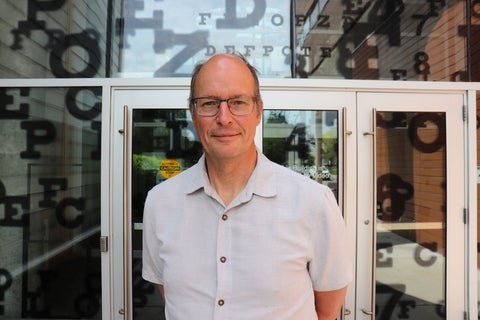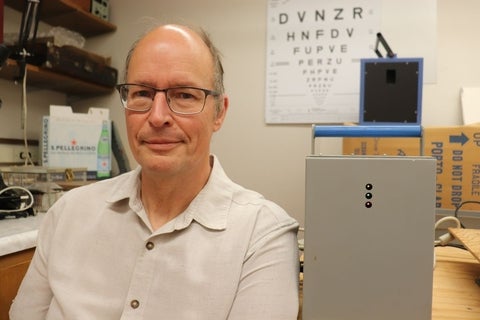Dr. Jeff Hovis is retiring after 38 years of research, teaching and clinical work mostly focused on colour vision, vision standards and binocular vision

By Karen Kawawada
People such as police officers, pilots and railway dispatchers are responsible for keeping people safe. Dr. Jeff Hovis has helped ensure their vision is up to the job.
Hovis, an associate professor with the University of Waterloo School of Optometry and Vision Science, has helped multiple Canadian agencies appropriately set vision standards since the mid-1980s.
Now, as he moves into retirement, he leaves a legacy of applied scholarship that has made him a sought-after consultant in areas such as aviation, maritime, rail, police and military vision standards.
Hovis grew up in a small town outside Toledo, Ohio, and went to The Ohio State University for his optometry degree and concurrent master’s. During his PhD at Indiana University, Hovis had a chance to delve deeply into colour vision, which fascinated him.
About eight per cent of males and half a per cent of females have colour vision deficits. There are, however, some unusual cases, such as people who have four types of colour-perceiving cones in the eye rather than the usual three. Hovis even encountered a man who claimed his colour blindness was cured when he fell out of a tree – the original problem may have been caused by a bone or blood vessel abnormality.
Hovis started as an assistant professor at the University of Waterloo in 1986, attracted by its friendly and energetic feel. Soon after, his expertise in colour vision and binocular vision – another field of interest – came in handy when he was invited to participate in reviewing vision standards for civil aviation.
At the time, there was no comprehensive summary of vision standards in Canada, so he started by putting one together. He continued periodically updating the summary throughout his career, creating a valuable resource for all concerned.

Jeff Hovis with the colour lantern testing equipment he developed for rail workers
Vision standards are important in occupations where performance of some tasks is dependent on vision. For example, a locomotive engineer needs to be able to distinguish between different-coloured lights because they govern the train speed. A police officer or firefighter, while permitted to wear corrective lenses, needs a minimum level of uncorrected vision in case they lose their glasses or contact lenses in the line of duty.
In some areas, standards have changed over the years, whether because technologies have changed job requirements or because research has helped fine-tune standards. The advent of refractive laser surgery has also opened career paths for people who would not previously have qualified.
Hovis has been a major part of setting vision standards in Canada and has consulted in other countries, notably the U.S. and Australia. He has developed tests specific to certain jobs, such as a colour lantern test he developed for CN Rail and now used by all major Canadian railways. He has considered factors such as whether wearing tinted sunglasses affects job performance and helped set guidelines in areas such as these.
Another area of interest for Hovis has been ensuring safety eyewear is truly safe without compromising vision. Most notably, he worked with colleague Dr. Ralph Chou, now a Waterloo professor emeritus, on evaluating safety eyewear for the Canadian military, ensuring high performance and optical quality.
With Dr. Graham Strong, also a professor emeritus of the School, Hovis evaluated Canadian bank notes for colour, contrast and accessibility for the visually impaired.
Because of his research interests, Hovis was asked to join the Canadian National Committee of the Commission Internationale d’Eclairage (CNC/CIE), the international standardization organization for vision and lighting. He represented Canada on the international commission (Division 1: Vision and Colour) starting in 2017 and was president of the CNC/CIE from 2020 to 2023.
Hovis has won numerous awards for his work over the years, most recently the 2024 Thomas J. and Margaret D. Tredici Award from the Aerospace Medical Association (AsMA).
“Dr. Hovis’s original research, test designs and academic teaching about aviation-related color vision tasks and testing has established him at the pinnacle of those disciplines,” said AsMA in a news release.
Hovis has enjoyed teaching over the years, particularly lecturing about colour vision. He has also kept one foot firmly in clinical practice, working regularly with patients and students in the binocular vision service of the Waterloo Eye Institute.
Even after his retirement on July 31, he’ll stay active in research. However, he’ll have a chance to enjoy more travel – he and his wife are heading to Greece and Cyprus this summer – as well as bike riding and time with his two adult children.
“I’ll remember the collegial aspect of working here,” says Hovis. “I’ll miss talking with the patients and meeting students from all over Canada.”
His parting message to colleagues and students? Says Hovis: “Keep having fun.”